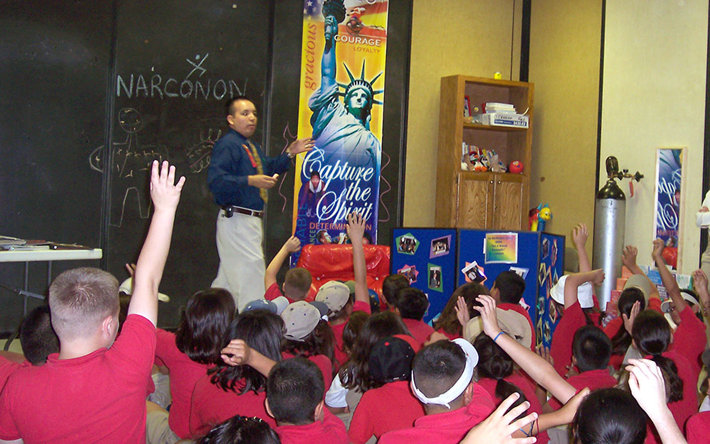Preventing Drug Abuse among South Texas Youth
In South Texas where so many drugs come across the US-Mexican border, preventing youth from starting abuse of drugs is particularly important. Many of the small towns and rural areas along the border are disadvantaged, especially since many of the manufacturing businesses in this region have moved overseas. Jobs are scarce and this can increase desperation and drug abuse in homes. Youth frequently lack sober influences among their parents, aunts, uncles, and siblings.

In Harlingen, it’s not enough that Narconon South Texas provides rehabilitation services for the addicted. They also provide drug prevention classes for tens of thousands of students in the area. The focus of the classes is the Lower Rio Grande Valley. This valley consists of Starr County, Hidalgo County, Willacy County and Cameron County, the last being the location of Narconon South Texas.
But this area is plagued by plenty of gang activity—youth who may think they already know all the answers. It takes a special approach to drug prevention to get through to these schoolchildren so that they can change their minds if they think that drug abuse is acceptable. In the four decades of rehabilitation and prevention activities, the Narconon drug prevention classes are some of the most effective in getting through to those young minds.
Statements from the youth themselves provide insight into the way these young minds can be changed by one of these presentations. Here are some of their comments, provided on surveys they filled in after the classes.
When asked “What did you think of the talk?”, some of them said:
- “I learned new things I had never known before. People always tell us that drugs are bad but they don’t explain why.”
- “I liked the speaker. He isn’t like all the other ones we’ve had to listen to.”
- “I thought it was interesting because one day I would like to help someone when they have drug problems.”
- “I thought it was a good talk because when we get to middle school, then those kids would get us into that and we wouldn’t know what to do. You got your point across and let me see more than I have.”
The students were then asked if they changed their minds as a result of the talk. They replied:
- “Yeah, because I thought drugs weren’t that dangerous before the talk.”
- “My thoughts kind of did change after hearing the talk yesterday. I already knew drugs were bad but with the presentation, I know they are worse.”
- “Drugs don’t only affect the person consuming the drug but also family and whoever is exposed to them out in the road.”
- “Yes, because I have a guy friend who drives me everywhere I want to go and he’s drunk. But you never know what’s going to happen.”
- “I used to think drugs are good but now I changed my mind.”
- “I used to drink beer but when I heard that is is bad, I am not going to drink beer no more.” (Elementary school.)
- “I thought it was going to be easy to just say no. Now I understand that there is a lot of peer pressure that is involved with drugs.”
- “Yes, my thoughts did change and I realized that drugs can make you weak and kill you.”
- “Yes, because I didn’t think alcohol could cause that much damage in our bodies.”
When the children were asked how they felt they could use this information, many of them were concerned about family members who were abusing drugs or alcohol:
- “I’m going to talk to my dad and brother to stop drinking.”
- “I should tell my Uncle Joe not to drink or do drugs.”
- “I can tell my brothers that do drugs not to do them.”
- “My dad drinks and I can explain to him what it does and why he shouldn’t drink alcohol.”
- “I can tell my big brother because he was thinking about using drugs. I can tell him the truth.”
- “I can tell my youngest cousin that is 13 to stop doing drugs.”
- “I am going to tell my grandpa not to drink any more.”
Other youth saw how this information would help them stay sober in the future, like this one:
- “I’ll be more careful about the parties I go to and if I ever get into a situation where people offer me drugs, I’ll know the bad things that can happen and I’ll be convinced not to.”
These responses prove how effective it is to care for youth and educate them accurately on the truth about drugs. In the Lower Rio Grande Valley, this is another way that the fight against drug abuse is being won.